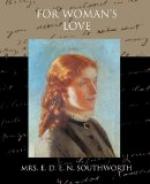“Then they left the parsonage together.
“She had forgotten all about the parting note of malediction which she had left behind her on the stand, as she stepped along the lane leading to the highway.
“He asked her to take his arm, and when they reached the public road, he inquired if she were game for a ten mile walk.
“She told him that she could walk to the end of the world with him, because she was so happy to be beside the only one on earth who had ever been kind to her—since her father’s death.
“Then he explained the steps that he had taken, and must still take, to elude pursuit; how that he had gone to the railway station and bought a first class ticket for the four o’clock express to London, and afterward, when the train came up, he had mingled with the crowd getting off and getting on, and so eluded observation, and had slipped away and hidden himself in the thicket until dark, so as to make every one concerned believe that he had gone off by the mail train alone to London.
“Now he told her that they must trudge straight on ten miles north, to take the train to Glasgow; so that while people were hunting for them in the south, they would be safe in the north.
“As they walked on he told her that he wanted to get away from England and see the world—the new world across the ocean. He had seen Europe summer after summer, traveling with his father and mother on the Continent. Now he wanted to see America; and asked her if she did not also.
“She told him that she wanted to see every place that he wanted to see, and to go everywhere he wanted to go, for that he was the only friend she had in all the wide world.
“So they walked on for about three hours, and then, about two o’clock in the morning, they reached the little railway station of Skelton. They had to wait two hours for the parliamentary train, which came heavily puffing in about five o’clock on that November morning.
“Young Whyte took second class tickets, and led his closely veiled companion to her seat on the train. And they moved off.
“They reached Glasgow about ten o’clock the next day, and found that there was a steamer bound for New York, to sail at noon. No time was to be lost, so they both went to the agency together, represented themselves as a newly married pair, and engaged the only stateroom to be procured—which happened to be in the second cabin. Their tickets were filled in with the names of Mr. and Mrs. Alfred Whyte—which indeed constituted a legal marriage in Scotland, where a marriageable pair of lovers have only to declare themselves man and wife, in the presence of competent witnesses, to be as lawfully married as if the ceremony had been performed by the Archbishop of Canterbury in his own cathedral.
“They took possession of their stateroom on the Caledonian, which sailed at noon of the same day, and in due time arrived at New York.




